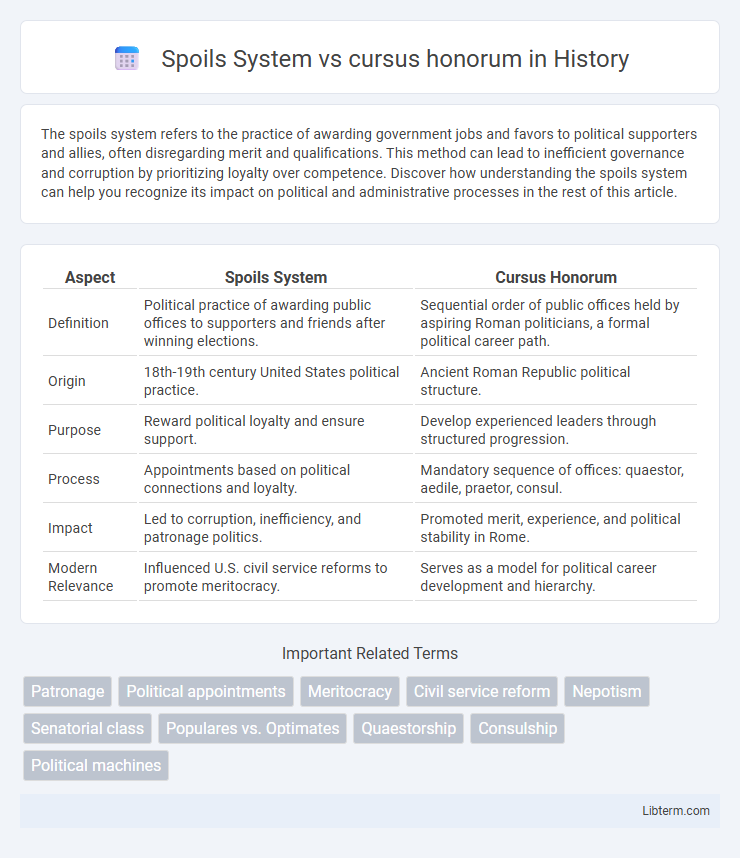The spoils system refers to the practice of awarding government jobs and favors to political supporters and allies, often disregarding merit and qualifications. This method can lead to inefficient governance and corruption by prioritizing loyalty over competence. Discover how understanding the spoils system can help you recognize its impact on political and administrative processes in the rest of this article.
Table of Comparison
| Aspect | Spoils System | Cursus Honorum |
|---|---|---|
| Definition | Political practice of awarding public offices to supporters and friends after winning elections. | Sequential order of public offices held by aspiring Roman politicians, a formal political career path. |
| Origin | 18th-19th century United States political practice. | Ancient Roman Republic political structure. |
| Purpose | Reward political loyalty and ensure support. | Develop experienced leaders through structured progression. |
| Process | Appointments based on political connections and loyalty. | Mandatory sequence of offices: quaestor, aedile, praetor, consul. |
| Impact | Led to corruption, inefficiency, and patronage politics. | Promoted merit, experience, and political stability in Rome. |
| Modern Relevance | Influenced U.S. civil service reforms to promote meritocracy. | Serves as a model for political career development and hierarchy. |
Introduction to Spoils System and Cursus Honorum
The spoils system, emerging in 19th-century American politics, involved awarding government jobs to political supporters as a reward for loyalty, emphasizing patronage over merit. In contrast, the cursus honorum was a structured sequence of public offices in ancient Rome that prescribed a formal path of political and military career advancement based on experience and rank. While the spoils system prioritized partisan allegiance, the cursus honorum emphasized a hierarchical progression through specific magistracies to qualify for higher political authority.
Historical Origins and Development
The spoils system originated in early 19th century America as a method of rewarding political supporters with government jobs, significantly popularized during Andrew Jackson's presidency in the 1820s. In contrast, the cursus honorum was a structured sequence of public offices in ancient Rome, established during the Republic to organize the political career path of Roman senators. While the spoils system emphasized partisan loyalty and patronage, the cursus honorum focused on meritocratic advancement through fixed magistracies like quaestor, aedile, praetor, and consul.
Core Principles of the Spoils System
The Spoils System is fundamentally based on political patronage, rewarding loyal supporters with government jobs as a means to consolidate power and loyalty, contrasting sharply with the cursus honorum, which emphasized a structured, merit-based progression through public offices in ancient Rome. Core principles of the Spoils System include favoritism, political loyalty, and the exchange of government positions for party support, often leading to inefficiency and corruption. This system prioritizes political allegiance over experience or qualifications, undermining institutional stability and governance quality.
Structure and Stages of the Cursus Honorum
The Spoils System distributes political appointments based on party loyalty, lacking formal stages or hierarchical progression. In contrast, the Cursus Honorum represents a structured sequence of public offices in Ancient Rome, beginning with the quaestorship, advancing through the aedileship or tribunate, then the praetorship, and culminating in the consulship. This hierarchical framework mandated specific age requirements and intervals between offices, ensuring systematic accumulation of experience and authority.
Key Differences: Merit vs. Patronage
The Spoils System emphasizes political patronage by rewarding supporters with government positions regardless of qualifications, promoting loyalty over merit. In contrast, the cursus honorum is a structured sequence of public offices in ancient Rome requiring demonstrated competence and experience, prioritizing merit and formal achievement. This fundamental difference highlights the Spoils System's focus on political favoritism and the cursus honorum's emphasis on earned advancement through proven capability.
Impact on Government Efficiency
The Spoils System prioritized loyalty over competence, leading to widespread political patronage and inefficiency in government operations. In contrast, the cursus honorum established a structured career path with merit-based advancement, promoting experienced leadership and administrative continuity. This systematic approach enhanced government efficiency by ensuring officials possessed the necessary skills and expertise.
Influence on Political Corruption
The spoils system fosters political corruption by allowing elected officials to reward loyal supporters with government positions, often prioritizing allegiance over competence and leading to inefficiency and nepotism. In contrast, the cursus honorum, as a structured sequence of public offices in ancient Rome, emphasized merit, experience, and legal qualifications, thereby reducing opportunities for corrupt patronage. While the spoils system directly incentivizes favoritism, the cursus honorum promotes accountability through defined career progression and institutional checks.
Societal Effects and Public Perception
The Spoils System often led to widespread public mistrust due to its association with corruption and favoritism, undermining institutional integrity and citizen confidence in government effectiveness. In contrast, the cursus honorum, as a structured political career path in ancient Rome, promoted merit-based progression and reinforced social hierarchy, fostering a perception of stability and order. Societal effects of the Spoils System included increased political patronage and nepotism, whereas the cursus honorum emphasized duty, experience, and civic responsibility among elites.
Legacy in Modern Political Systems
The spoils system, characterized by political patronage and rewarding supporters with government jobs, laid foundations for political party loyalty but often resulted in corruption and inefficiency, prompting reforms like civil service exams. In contrast, the cursus honorum structured a merit-based, sequential path of public offices in ancient Rome, promoting administrative competence and leadership development. Modern political systems inherit the spoils system's challenges and the cursus honorum's emphasis on experience, influencing contemporary debates on meritocracy, political appointments, and institutional integrity.
Conclusion: Lessons from History
The Spoils System illustrates the dangers of prioritizing political loyalty over competence, leading to corruption and inefficiency in governance. In contrast, the cursus honorum exemplifies a structured career path emphasizing merit, experience, and gradual responsibility in public office. Historical lessons emphasize the importance of meritocratic principles to ensure stable and effective administration.
Spoils System Infographic

 libterm.com
libterm.com